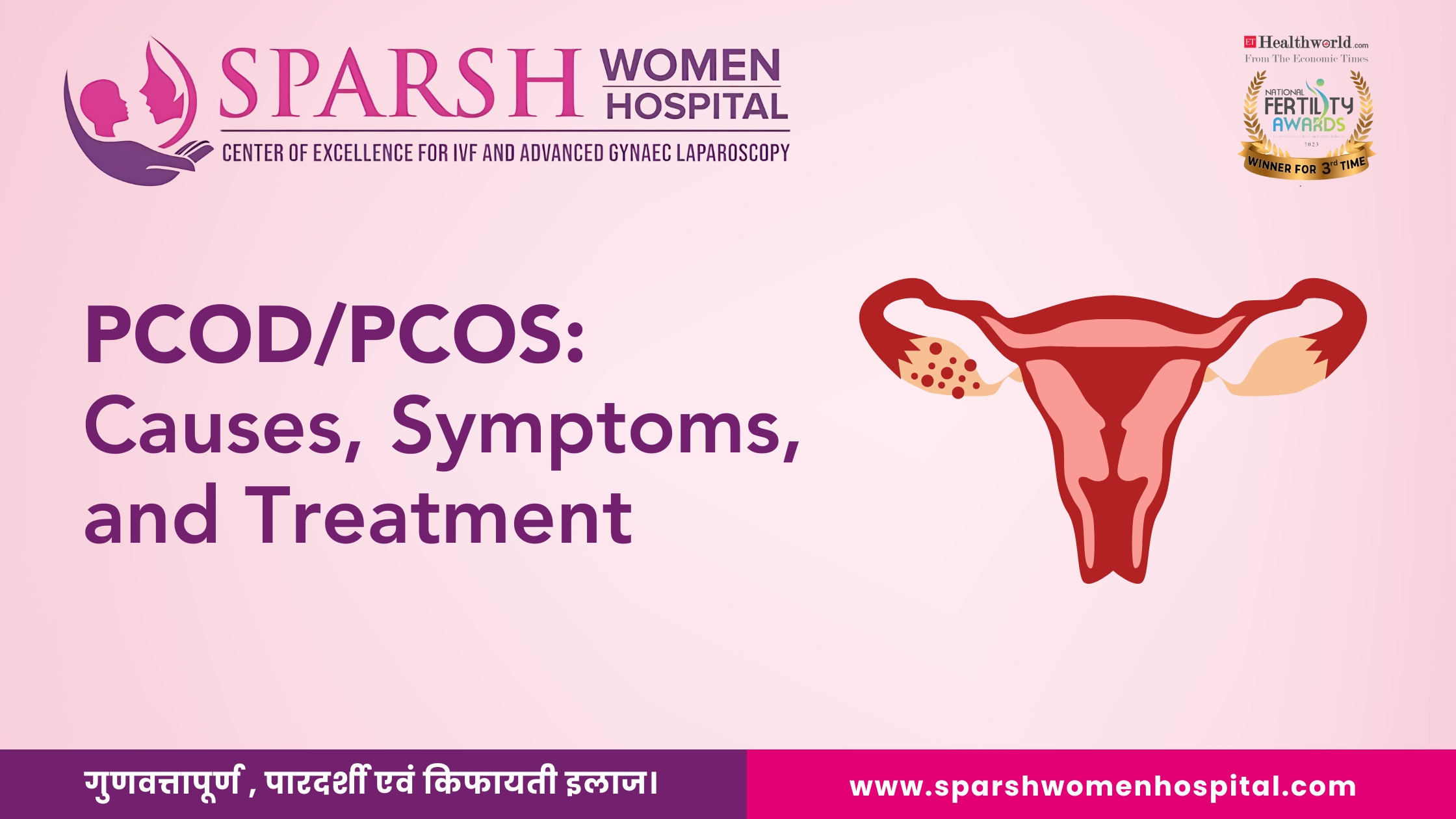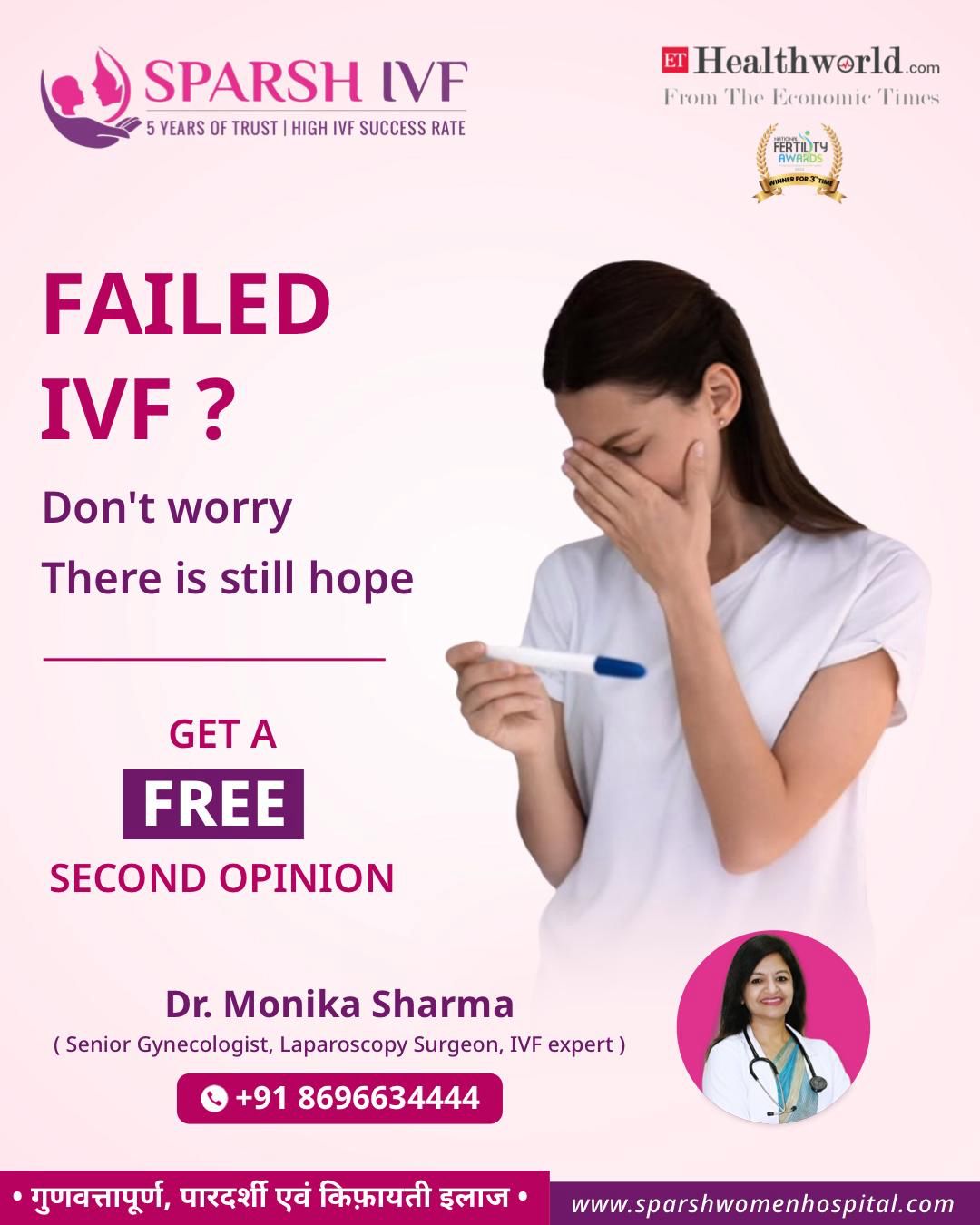
PCOD/PCOS: Causes, Symptoms, and Treatment at Sparsh Women’s Hospital
Polycystic Ovary Syndrome (PCOS), also known as Polycystic Ovarian Disease (PCOD), is a common hormonal disorder affecting millions of women worldwide, particularly those of reproductive age. Despite its prevalence, PCOS remains a complex and often misunderstood condition that can significantly impact a woman’s health and quality of life. Fortunately, with proper diagnosis and treatment, women with PCOS can manage their symptoms and lead fulfilling lives. Sparsh Women’s Hospital in Udaipur has emerged as a beacon of hope, offering comprehensive care and tailored treatment plans for women dealing with PCOS.
What is PCOD/PCOS ?
PCOS is a condition characterized by hormonal imbalances that affect a woman’s ovaries and overall reproductive health. The ovaries produce excess male hormones (androgens), leading to the development of multiple small cysts (fluid-filled sacs) on the ovaries. This hormonal imbalance disrupts the regular menstrual cycle, often resulting in irregular or absent periods, and can affect fertility.
PCOS is a multifaceted disorder, with symptoms and severity varying widely among individuals. Some women may experience only mild symptoms, while others face more significant challenges. Early diagnosis and intervention are crucial for managing the condition effectively and preventing long-term complications.
Causes of PCOD/PCOS
The exact cause of Polycystic Ovary Syndrome (PCOS) remains unclear, but several factors are believed to contribute to its development. These include:
-
Genetics: A family history of PCOS increases the likelihood of developing the condition, suggesting a strong genetic component.
-
Insulin Resistance: Many women with PCOS have insulin resistance, where the body's cells do not respond effectively to insulin. This leads to elevated blood sugar levels and can result in weight gain and an increased risk of type 2 diabetes.
-
Hormonal Imbalance: An overproduction of androgens, the male hormones typically present in small amounts in women, is a hallmark of PCOS. Elevated androgen levels contribute to symptoms such as excessive hair growth (hirsutism), acne, and male-pattern baldness.
-
Low-Grade Inflammation: Research suggests that women with PCOS may have low-grade inflammation, which stimulates polycystic ovaries to produce androgens, worsening the condition.
-
Lifestyle Factors: While lifestyle alone does not cause PCOS, factors such as poor diet, lack of physical activity, and stress can exacerbate symptoms and contribute to the development of insulin resistance and obesity.
Symptoms of PCOD/PCOS
PCOS presents with a wide range of symptoms, which can vary from woman to woman. The most common symptoms include:
-
Irregular Menstrual Cycles: Women with PCOS often experience irregular, infrequent, or prolonged menstrual periods. Some may have fewer than eight periods a year or no periods at all.
-
Ovulation Problems: PCOS is a leading cause of infertility due to irregular or absent ovulation. This makes it difficult for women with PCOS to conceive.
-
Excess Androgen Levels: Elevated androgen levels can lead to physical symptoms such as hirsutism (excessive hair growth on the face, chest, and back), severe acne, and male-pattern baldness or thinning hair.
-
Weight Gain: Many women with PCOS struggle with weight gain, particularly around the abdomen. This is often linked to insulin resistance.
-
Skin Changes: Darkening of the skin, particularly around the neck, groin, and underneath the breasts (acanthosis nigricans), and the appearance of skin tags are also common in women with PCOS.
-
Emotional Symptoms: PCOS can have a significant impact on mental health, leading to anxiety, depression, and low self-esteem due to the physical symptoms and challenges associated with the condition.
-
Long-Term Health Risks: Women with PCOS are at an increased risk of developing chronic health conditions such as type 2 diabetes, heart disease, high blood pressure, and endometrial cancer.
Diagnosis and Treatment at Sparsh Women’s Hospital
At Sparsh Women’s Hospital, understanding the complexities of PCOS is the first step toward effective treatment. The hospital’s team of gynecologists and fertility specialists is dedicated to providing comprehensive care tailored to each patient’s unique needs.
-
Comprehensive Diagnosis:
Accurate diagnosis is essential for developing an effective treatment plan. Sparsh Women’s Hospital utilizes state-of-the-art diagnostic tools and procedures to identify PCOS and its underlying causes. This includes a thorough medical history, physical examination, blood tests to measure hormone levels, and imaging tests such as ultrasound to assess the ovaries. -
Personalized Treatment Plans:
Recognizing that PCOS affects each woman differently, Sparsh Women’s Hospital creates individualized treatment plans that address specific symptoms and health concerns. The hospital’s approach is holistic, combining medical treatments with lifestyle modifications to achieve the best possible outcomes. -
Lifestyle Modifications:
Lifestyle changes are often the first line of defense in managing PCOS. Weight management through a healthy diet and regular exercise can help regulate menstrual cycles, reduce insulin resistance, and lower androgen levels. The hospital’s specialists provide guidance on nutrition and physical activity, empowering women to take control of their health. -
Medication Management:
In cases where lifestyle modifications alone are insufficient, Sparsh Women’s Hospital prescribes medications to help regulate hormones and manage symptoms. Common treatments include: -
Oral Contraceptives: Birth control pills help regulate menstrual cycles, reduce androgen levels, and alleviate symptoms such as acne and excessive hair growth.
-
Metformin: This medication improves insulin sensitivity and can help with weight management and menstrual regularity.
-
Anti-Androgens: These medications reduce androgen levels, addressing symptoms like hirsutism and acne.
-
Fertility Treatments:
For women with PCOS who are struggling to conceive, Sparsh Women’s Hospital offers advanced fertility treatments. These include ovulation induction with medications such as clomiphene citrate or letrozole, and assisted reproductive technologies (ART) like in vitro fertilization (IVF). The hospital’s fertility specialists work closely with patients to develop a fertility plan tailored to their needs and goals. -
Emotional Support:
Managing PCOS can be emotionally challenging, particularly when dealing with symptoms that affect physical appearance and self-esteem. Sparsh Women’s Hospital provides counseling and support services to help women navigate these challenges. The hospital’s compassionate approach ensures that patients receive not only medical care but also the emotional support needed to cope with the psychological impact of PCOS.
Taking Control of PCOS: A Path to Wellness
Polycystic Ovary Syndrome (PCOS) is a lifelong condition, but with the right support and treatment, women can manage their symptoms and lead healthy, fulfilling lives. Early diagnosis and intervention are key to preventing the long-term complications associated with PCOS, such as diabetes, heart disease, and infertility.
Sparsh Women’s Hospital in Udaipur is committed to providing the highest quality care for women with PCOS. The hospital’s comprehensive approach, which includes accurate diagnosis, personalized treatment plans, and ongoing support, empowers women to take control of their health and well-being.
Please contact us for more details : info@sparshwomenhospital.com
Call : +91 7878305787 | +918696634444



Post Your Comment